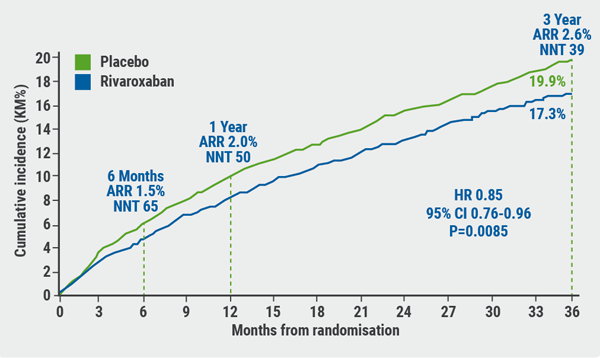Dr Deepak Bhatt (Brigham and Women's Hospital, USA) presented the results of the REDUCE-IT EPA analysis, which was based on the initial study including 8,179 patients at 473 sites in 11 countries who had elevated CV risk and were using statins. They were randomised to IPE 2 g twice daily (n=4,089) or placebo (n=4,090) with a mean duration of 4.9 years of follow-up. Results showed that icosapent ethyl 4 grams daily compared with placebo resulted in a reduced combined rate of first and subsequent non-fatal myocardial infarction, stroke, CV death, coronary revascularisation, or hospitalisations for unstable angina by 25% and 30%, respectively. Subsequently, serum EPA levels were measured and compared with the placebo group. Patients were grouped by EPA level tertiles (<20, 20-34, >34 µg/mL) and averaged across visits.
Results suggest that higher EPA serum levels within the IPE group were strongly associated with reduced CV events; significant associations were found with all measured CV outcomes. The higher the serum EPA level was, the lower the rate of the various CV events, CV deaths, and even total mortality (P for interaction=0.91). Overall, the drug significantly increased serum EPA levels by 386% from baseline to 1-year when compared with placebo, and was sustained out to 5 years in the IPE arm (P<0.0001), while it remained more or less unchanged in the placebo arm. Docosahexaenoic acid (DHA) was also measured and its level decreased (-2.9%), suggesting that it plays no role in the observed CV benefits, which are considered to be the result of EPA. Also, patients with highest on-treatment EPA levels had a significant reduction in hospitalisations for new onset heart failure with the drug compared with placebo. Furthermore, significant associations were observed between on-treatment EPA levels and a lower risk of sudden cardiac death and cardiac arrest.
The results of this trial indicate that the use of IPE 2 g twice daily was superior to placebo in reducing triglycerides, CV events, and CV death among patients with high triglycerides and either known CV disease or those at high risk for developing it, and who were already on statin therapy with relatively well-controlled LDL levels. Dr Bhatt concluded that these are exciting findings that may open a new field of study and hopefully treatment options.
- Bhatt DL, et al. Abstract 411-14. ACC/WCC 28-30 March 2020.
Posted on
Previous Article
« Adjuvant osimertinib in NSCLC: practice changing ADAURA trial Next Article
ES-SCLC: tremelimumab + durvalumab + chemotherapy misses endpoint »
« Adjuvant osimertinib in NSCLC: practice changing ADAURA trial Next Article
ES-SCLC: tremelimumab + durvalumab + chemotherapy misses endpoint »
Table of Contents: ACC/WCC 2020
Featured articles
Heart Failure and Cardiomyopathies
Mavacamten shows promising results in non-obstructive hypertrophic cardiomyopathy
Vericiguat shows beneficial effects in a very high-risk HF population
No role for sodium nitrite in out-of-hospital cardiac arrest
Vascular Medicine and Thromboembolism
Rivaroxaban and aspirin effective and safe for PAD patients
TAILOR-PCI misses endpoint but still provides valuable insights
Edoxaban: alternative to warfarin after surgical aortic or mitral valve procedures?
Bleeding reduction post-TAVI with OAC alone vs OAC + clopidogrel
Apixaban offers new perspective for cancer patients in need of anticoagulation
Rivaroxaban superior to enoxaparin in preventing VTE in non-major orthopaedic surgery
Interventional Cardiology
TAVR safe and effective in low-risk bicuspid aortic stenosis patients
TAVR model reveals differences in hospital outcomes
2-year results show non-significant outcomes TAVR vs surgery in severe aortic stenosis
Renal denervation better than sham for blood pressure
Infusion of ethanol in the vein of Marshall for persistent AF
Atrial Fibrillation/Acute Coronary Syndrome
Fewer adverse events with ticagrelor monotherapy after 3 months DAPT
TWILIGHT sub-study: same outcomes for diabetes patients
TWILIGHT sub-study: complex PCI patients
LAAO Watchman registry data positive
Apixaban in AF patients with recent ACS/PCI: Drop aspirin after 30 days
Genetics and Prevention
Homozygous FH responds to alirocumab
Evinacumab significantly reduces LDL-C in homozygous FH patients
Higher serum levels of eicosapentaenoic acid correlate with reduced CV events
Quit smoking: vaping + counselling helps
Related Articles

September 7, 2020
Rivaroxaban and aspirin effective and safe for PAD patients
© 2024 Medicom Medical Publishers. All rights reserved. Terms and Conditions | Privacy Policy
HEAD OFFICE
Laarderhoogtweg 25
1101 EB Amsterdam
The Netherlands
T: +31 85 4012 560
E: publishers@medicom-publishers.com

